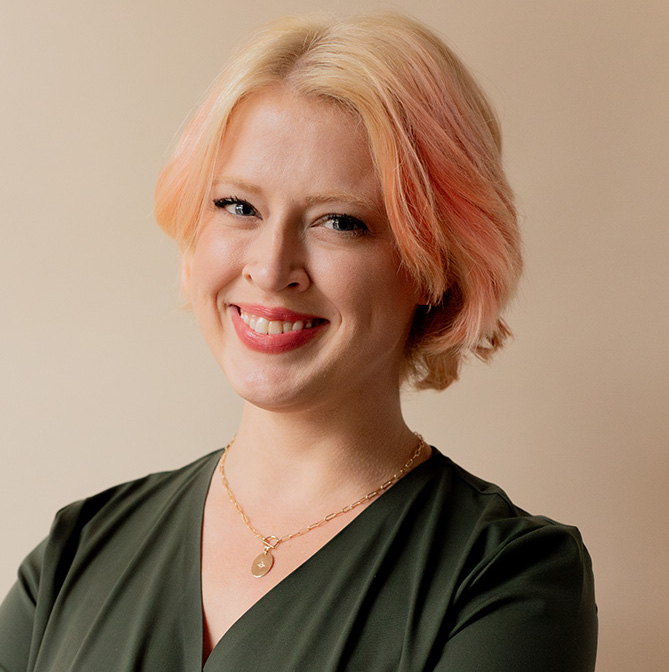
How I Check In On My Mental Health When I’m In A Slump
I am in a slump.
One of those “wrap me in blankets like a burrito and tell me nice things while you feed me cheese” kinds of slumps. My morning routine has imploded, my journal is empty, and somehow grocery shopping and meal planning have become the most difficult things on the planet. And even though I have a few things on the calendar to look forward to, I’m feeling stagnant.
Not the worst of the worst, but I’m not thriving either. And it’s difficult to see a way out.
All my fellow slumps understand this—that un-slumping is hard. It sometimes feels easier to stay stuck in slump swamp than go through all the work of unsticking yourself. In reality though, checking in on your mental health is one of the most important things you can do in these moments. Call it a slump or a rut, or perhaps it’s full-on depression—wherever you’re at and whatever word you’re using, you’re not alone.
It’s never as simple as “snapping out of it” and getting your life back on track though, no matter what other folks might tell you. These moments of slump call for positive and supportive self talk, a soft place to land in your own heart, and a willingness to do this time and time again. I think that’s one of the beauties of life—the good times don’t last forever, and neither do the bad times. I hope that’s a comfort to you.
“That’s one of the beauties of life—the good times don’t last forever, and neither do the bad times.”
So here’s how I’m checking in on my mental health right now, in addition to talking it all through with friends, family, and therapists. Consider me a virtual hand reaching out towards you, and let’s get unstuck together.
1. Determine whether you’re in a slump, and let it out
I’d love to keep tabs on my mental health at all times, but sometimes I go on auto-pilot and brush off regular check-ins. So I try to recognize the indicators of when I really need to press pause and evaluate where I’m at. I check in on myself when I notice I’m more angry, anxious, or irritable, or when I realize the past few weeks have been a blur (ahem, or the past few years). Sometimes its as simple as realizing I’m eating more, or less, or more processed foods than usual. The biggest indicator that I need a mental health check-in, though, is when I shrink away from my self-image and start feeling like a spectator of my own life.
Like most things in life, this experience lies on a spectrum. On one end of things, you’re moving seamlessly through your days, proactively planning your needs and wants, and squeaking in a little exercise and a shower now and again. On the other end of things, you might need to get in touch with a therapist, psychiatrist, or doctor to help support yourself as you’re working through things. Both are okay! I’ve been on both ends, and I’ve found the slump lives somewhere in between.
That middle place that can feel confusing—the garden isn’t overrun with weeds, but it’s not vibrant and blossoming, either. These times are the most difficult to check in on myself, but it’s worth it to do before my mental health deteriorates further.
So I do just that—usually in a journal, but I also hold conversations with myself while I’m doing simple daily tasks. I ask myself, do I like my job? My apartment? My wardrobe? My relationships? My self? I examine the emotional, physical, and spiritual pain points I’m feeling and get them down on paper or speak them out loud to an empty room. Anything that makes me feel like my feelings are expressed and valid.
“The biggest indicator that I need a mental health check-in is when I shrink away from my self-image and start feeling like a spectator of my own life.”
2. Clear your mind
Self: assessed, slump: verified. What next? This is one of the steps that feels the cheesiest, but I feel like it’s been the most essential for getting me back on track: I spend some time with myself.
Spend time on your own, whether it’s going to the beach or the grocery store, and clear your head. Practice presence wherever you land; give your lovely brain a few moments to do nothing other than experience the taste of a beer or the feel of a ripe lemon in your hand. Meditation apps can offer you some quiet space to just exist without investing too much time or money.
What’s most important about this part, in my experience, is not to force a solution. I exhaust myself all the time looking for solutions to problems that just need a little time and a little bit of space in my mind. I don’t approach these moments as time to “fix myself” as much as I embrace them as a reminder to “be myself.” To return to my neutral state.
3. Look at the facts
Once you’ve reached equilibrium (or as close to it as you can), list out the facts of your situation in your journal, in your voice memos app, or with a friend. Objectivity is more helpful than judgmental language like “too much” or “not enough” in these moments. For example, instead of saying you drink too much coffee, write down on paper how many cups of coffee you drink in a day. Whether it’s two or twelve, this is all about fact-finding without the self-guilt trip.
Make sure you have a self-care practice set up for this step especially, since some of these truths can be difficult to acknowledge. Be honest, but be gentle with yourself.
4. Ask what you need more of
Then look at what you need more of. Because, personally, every time I start with something like I need to drink less coffee, I get discouraged and self-hatred-y. Instead, I look to additive things first.
The big three are always more sunshine, more water, and more sleep. Framing it this way first makes self-care feel abundant and accessible, instead of judging myself based on where I’m lacking. When I think about self-care as more rather than less, I know I’m more likely to do it. I also look to where I’m feeling the greatest insecurities: if I am feeling like a failure, I find ways to do more of what I know I’m good at. If I’m feeling frumpy, I wear the clothes and makeup that make me feel celebrated.
“Look for things you can do right now, and the things you need to change in the long term will come more easily.”
Look for things you can do right now, and the things you need to change in the long term will come more easily. Quick wins, like eating a handful of raspberries and drinking a glass of water, can help boost your confidence to make the big changes like moving or searching for a new job.
5. Ask what you need less of
Then I move into the more difficult work of telling myself the truth of what I need less of. This is hard, and it requires honesty. (Which is why I start with the positive stuff first!) To find which practices I could reduce, I examine my current habits and routines, and I pause whenever I feel a little catch in my gut. Where are the pain points in my day? What pain am I causing myself?
My needs change with the seasons, but right now, they are less negative self-talk, less booze, and less social media. Still here, as an aspiring perpetual optimist, I try to focus on replacing over removing. What can I add to my day to help support swapping these out?
Ditch the judgmental language and extend compassion to yourself like you might for a fussy, worn-out child.
6. Make this a habit
And finally comes the challenge of doing this day after day, week after week.
I try to journal and ask myself, in writing, how are you doing today? It makes me feel a little more connected to myself and grants permission for me to be honest rather than performative. (I’ve even shared some of my favorite ways to journal about various feelings here.) And when I’m in a good writing habit, I can go back to the archives to see how I was feeling last year at this time—oftentimes, I can see seasonal patterns and identify lingering stresses that still need to be addressed.
“Our mental health is a maze full of dead-ends and wrong turns, but that’s where support and self-care come in.”
You’re not always going to be able to check in on yourself, and you’re not always going to want to leave a slump. Our mental health is a maze full of dead-ends and wrong turns, but that’s where support and self-care come in. If you can’t unslump yourself today, take a nap and then a good shower, find a blanket, and drink some hot cocoa. You can try again tomorrow.
But don’t let this moment harden you to happiness; it is okay to remain soft and vulnerable. Treat yourself like you would treat a dear loved one going through a difficult time. Take the medicine that supports you, nurture the relationships that energize and inspire you, and remember: your experience is unique, but you are not alone.
Let’s do this.
Emily McGowan is the Editorial Director at The Good Trade. She studied Creative Writing and Business at Indiana University, and has over ten years of experience as a writer and editor in sustainability and lifestyle spaces. Since 2017, she’s been discovering and reviewing the top sustainable home, fashion, beauty, and wellness products so readers can make their most informed decisions. Her editorial work has been recognized by major publications like The New York Times and BBC Worklife. You can usually find her in her colorful Los Angeles apartment journaling, caring for her rabbits and cat, or gaming. Say hi on Instagram!




